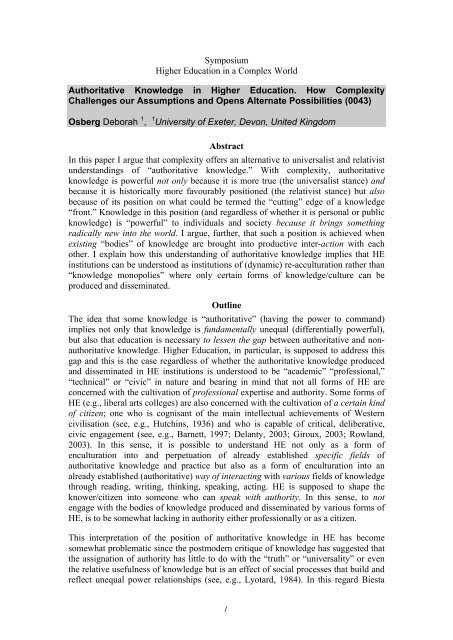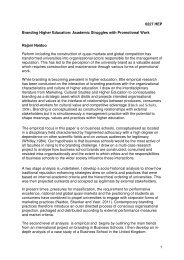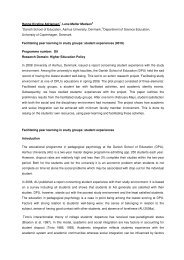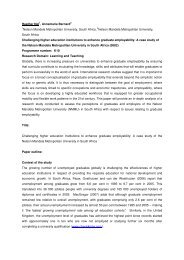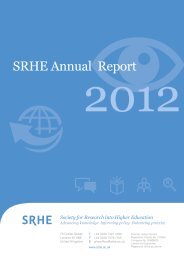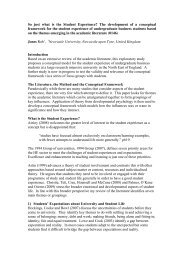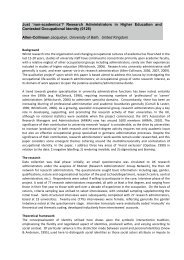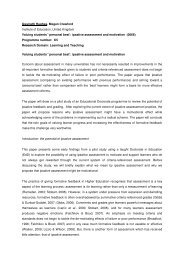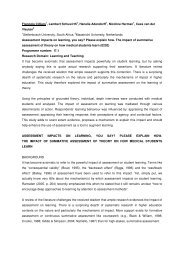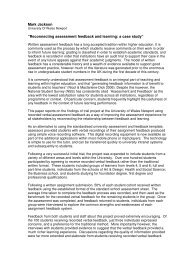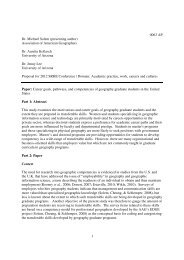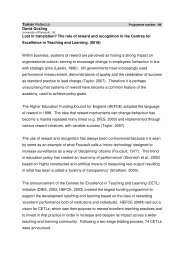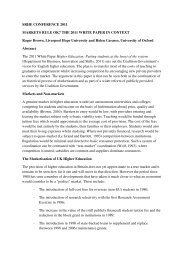Authoritative Knowledge in Higher Education. How Complexity ...
Authoritative Knowledge in Higher Education. How Complexity ...
Authoritative Knowledge in Higher Education. How Complexity ...
You also want an ePaper? Increase the reach of your titles
YUMPU automatically turns print PDFs into web optimized ePapers that Google loves.
Symposium<br />
<strong>Higher</strong> <strong>Education</strong> <strong>in</strong> a Complex World<br />
<strong>Authoritative</strong> <strong>Knowledge</strong> <strong>in</strong> <strong>Higher</strong> <strong>Education</strong>. <strong>How</strong> <strong>Complexity</strong><br />
Challenges our Assumptions and Opens Alternate Possibilities (0043)<br />
Osberg Deborah 1 , 1 University of Exeter, Devon, United K<strong>in</strong>gdom<br />
Abstract<br />
In this paper I argue that complexity offers an alternative to universalist and relativist<br />
understand<strong>in</strong>gs of “authoritative knowledge.” With complexity, authoritative<br />
knowledge is powerful not only because it is more true (the universalist stance) and<br />
because it is historically more favourably positioned (the relativist stance) but also<br />
because of its position on what could be termed the “cutt<strong>in</strong>g” edge of a knowledge<br />
“front.” <strong>Knowledge</strong> <strong>in</strong> this position (and regardless of whether it is personal or public<br />
knowledge) is “powerful” to <strong>in</strong>dividuals and society because it br<strong>in</strong>gs someth<strong>in</strong>g<br />
radically new <strong>in</strong>to the world. I argue, further, that such a position is achieved when<br />
exist<strong>in</strong>g “bodies” of knowledge are brought <strong>in</strong>to productive <strong>in</strong>ter-action with each<br />
other. I expla<strong>in</strong> how this understand<strong>in</strong>g of authoritative knowledge implies that HE<br />
<strong>in</strong>stitutions can be understood as <strong>in</strong>stitutions of (dynamic) re-acculturation rather than<br />
“knowledge monopolies” where only certa<strong>in</strong> forms of knowledge/culture can be<br />
produced and dissem<strong>in</strong>ated.<br />
Outl<strong>in</strong>e<br />
The idea that some knowledge is “authoritative” (hav<strong>in</strong>g the power to command)<br />
implies not only that knowledge is fundamentally unequal (differentially powerful),<br />
but also that education is necessary to lessen the gap between authoritative and nonauthoritative<br />
knowledge. <strong>Higher</strong> <strong>Education</strong>, <strong>in</strong> particular, is supposed to address this<br />
gap and this is the case regardless of whether the authoritative knowledge produced<br />
and dissem<strong>in</strong>ated <strong>in</strong> HE <strong>in</strong>stitutions is understood to be “academic” “professional,”<br />
“technical” or “civic” <strong>in</strong> nature and bear<strong>in</strong>g <strong>in</strong> m<strong>in</strong>d that not all forms of HE are<br />
concerned with the cultivation of professional expertise and authority. Some forms of<br />
HE (e.g., liberal arts colleges) are also concerned with the cultivation of a certa<strong>in</strong> k<strong>in</strong>d<br />
of citizen; one who is cognisant of the ma<strong>in</strong> <strong>in</strong>tellectual achievements of Western<br />
civilisation (see, e.g., Hutch<strong>in</strong>s, 1936) and who is capable of critical, deliberative,<br />
civic engagement (see, e.g., Barnett, 1997; Delanty, 2003; Giroux, 2003; Rowland,<br />
2003). In this sense, it is possible to understand HE not only as a form of<br />
enculturation <strong>in</strong>to and perpetuation of already established specific fields of<br />
authoritative knowledge and practice but also as a form of enculturation <strong>in</strong>to an<br />
already established (authoritative) way of <strong>in</strong>teract<strong>in</strong>g with various fields of knowledge<br />
through read<strong>in</strong>g, writ<strong>in</strong>g, th<strong>in</strong>k<strong>in</strong>g, speak<strong>in</strong>g, act<strong>in</strong>g. HE is supposed to shape the<br />
knower/citizen <strong>in</strong>to someone who can speak with authority. In this sense, to not<br />
engage with the bodies of knowledge produced and dissem<strong>in</strong>ated by various forms of<br />
HE, is to be somewhat lack<strong>in</strong>g <strong>in</strong> authority either professionally or as a citizen.<br />
This <strong>in</strong>terpretation of the position of authoritative knowledge <strong>in</strong> HE has become<br />
somewhat problematic s<strong>in</strong>ce the postmodern critique of knowledge has suggested that<br />
the assignation of authority has little to do with the “truth” or “universality” or even<br />
the relative usefulness of knowledge but is an effect of social processes that build and<br />
reflect unequal power relationships (see, e.g., Lyotard, 1984). In this regard Biesta<br />
1
(2007) has suggested that HE can be understood as constitut<strong>in</strong>g “a k<strong>in</strong>d of knowledge<br />
monopoly” (p. 478) <strong>in</strong> that it def<strong>in</strong>es (through its degree structures etc) what counts as<br />
authoritative knowledge and what <strong>in</strong> the wider society is seen as authoritative. 1 For<br />
this reason, Biesta suggests that HE’s “knowledge monopoly” can be understood as “a<br />
direct threat to democracy” (p. 478).<br />
To address this problem of authoritative knowledge <strong>in</strong> HE, Biesta draws on Dewey’s<br />
pragmatism to argue that HE’s “knowledge monopoly” is a threat to democracy only<br />
if we assume there is a s<strong>in</strong>gle valid way of see<strong>in</strong>g and understand<strong>in</strong>g the world. He<br />
argues that a Deweyan framework—which makes it possible to accept the<br />
situatedness of all knowledge—“allows us to ask questions about the relationships<br />
between different knowledges and worldviews” and that this makes it possible for HE<br />
to adopt “a reflective approach towards the production of scientific [authoritative]<br />
knowledge and the role of science [authoritative knowledge] <strong>in</strong> society” (p. 478).<br />
This, so he argues, implies that HE’s “knowledge monopoly” can make an important<br />
contribution to the “the democratization of knowledge and can thus support the<br />
development of … the knowledge democracy” (p. 478, emphasis orig<strong>in</strong>al).<br />
In this paper I draw on complexity theory to make a different argument about HE’s<br />
contribution to what Biesta calls the “knowledge democracy.” I argue, first, that with<br />
complexity it is possible to understand the “power” of authoritative knowledge <strong>in</strong> an<br />
emergent (or temporally irreversible) 2 sense (Osberg & Biesta, 2007) rather than<br />
(only) <strong>in</strong> a spatial (or temporally reversible) 3 sense (Osberg, Biesta & Cilliers, 2008).<br />
With a spatial understand<strong>in</strong>g of knowledge the universalist and relativist<br />
epistemological positions are polarized: either it is necessary to pit one body of<br />
knowledge aga<strong>in</strong>st another <strong>in</strong> a contest for “highest authority” or we must consider all<br />
knowledge to be fundamentally equal and accept that it is only circumstance that<br />
makes some bodies of knowledge more powerful or authoritative than others (see also<br />
Bernste<strong>in</strong>, 1983). With complexity, authoritative knowledge is powerful not only<br />
because it is “more true” 4 and because it is historically more favourably positioned<br />
but also because of its position on what could be termed the “cutt<strong>in</strong>g” edge of a<br />
knowledge “front.” <strong>Knowledge</strong> <strong>in</strong> this position (and regardless of whether it is<br />
personal or public knowledge) is “powerful” to <strong>in</strong>dividuals and society because it<br />
br<strong>in</strong>gs someth<strong>in</strong>g radically new <strong>in</strong>to the world. Furthermore, from a complexity<br />
perspective, such radical newness (genesis) can only be achieved when one exist<strong>in</strong>g<br />
“body” of knowledge is brought <strong>in</strong>to productive relation or <strong>in</strong>teraction with another<br />
exist<strong>in</strong>g “body” of knowledge.<br />
Draw<strong>in</strong>g on some ideas from Prigog<strong>in</strong>e and Stengers (1984) and Derrida (1990), I<br />
argue that this understand<strong>in</strong>g of authoritative knowledge becomes possible through<br />
the notion of “undecidability” (Derrida, 1990). With complexity, undecidability is the<br />
condition of possibility of the irreversible forward directionality mean<strong>in</strong>g mak<strong>in</strong>g<br />
(Sandbothe, 2001) and hence the condition of possibility of all knowledge generation.<br />
1 Note that Biesta (2007) describes “authoritative knowledge” as equivalent to “scientific knowledge”<br />
and he contrasts this with “everyday knowledge” which, so he argues, has less power than science<br />
because (and he uses Bruno Latour to argue this po<strong>in</strong>t) its networks are not as big, long and strong as<br />
those of science (p. 477).<br />
2 Ontologically active, <strong>in</strong> motion towards an open future.<br />
3 Ontologically static, where everyth<strong>in</strong>g, <strong>in</strong>clud<strong>in</strong>g the future, is already given.<br />
4 It is “more true” not <strong>in</strong> the universalist sense of the word, but <strong>in</strong> an emergentist sense.<br />
2
In plac<strong>in</strong>g undecidability at the very centre of the notion of authoritative knowledge,<br />
complexity (and deconstruction) can theorise this concept as a dynamic po<strong>in</strong>t of<br />
articulation between different but equal positions (“bodies” of knowledge). With this<br />
understand<strong>in</strong>g the knowledge “front” (i.e., the notion of knowledge hav<strong>in</strong>g an<br />
irreversible forward directionality) is not understood <strong>in</strong> terms of progression along a<br />
l<strong>in</strong>ear scale (as the notion of “scientific progress” usually implies). It is, rather, a po<strong>in</strong>t<br />
of dynamic articulation between multiple (equal) bodies of knowledge that are <strong>in</strong> a<br />
cont<strong>in</strong>ual process of emergence.<br />
This understand<strong>in</strong>g of authoritative (powerful) knowledge as a form of genesis or<br />
irreversible directionality challenges the idea that HE <strong>in</strong>stitutions are “knowledge<br />
monopolies” <strong>in</strong>to which people are encultured and opens the possibility to theorise<br />
them as “knowledge democracies” with<strong>in</strong> which new forms of knowledge can<br />
cont<strong>in</strong>uously emerge. This implies that HE <strong>in</strong>stitutions can be understood as<br />
<strong>in</strong>stitutions of (dynamic) re-acculturation rather than places where only certa<strong>in</strong> forms<br />
of knowledge/culture can be produced and dissem<strong>in</strong>ated.<br />
References<br />
Barnett, R. (1997). <strong>Higher</strong> <strong>Education</strong>: A Critical Bus<strong>in</strong>ess. Buck<strong>in</strong>gham: SHRE and Open<br />
University Press<br />
Bernste<strong>in</strong>, R (1983). Beyond Objectivism and Relativism: Science, Hermeneutics and Praxis.<br />
University of Pennsylvania Press<br />
Biesta, G. (2007). Towards the <strong>Knowledge</strong> Democracy? <strong>Knowledge</strong> Production and the Civic<br />
Role of the University. Studies <strong>in</strong> Philosophy and <strong>Education</strong> 26, 467-479.<br />
Delanty, G. (2003). Ideologies of the <strong>Knowledge</strong> Society and the Cultural Contradictionsof<br />
<strong>Higher</strong> <strong>Education</strong>. Policy Futures <strong>in</strong> <strong>Education</strong> 1(1), 71-82.<br />
Derrida, J. (1990). Force of Law. The Mystical Foundation of Authority. Deconstruction and<br />
the Possibility of Justice. Cardozo Law Review 11 (5-6) 919-1045.<br />
Giroux, H. (2003). Sell<strong>in</strong>g Out <strong>Higher</strong> <strong>Education</strong>. Policy Futures <strong>in</strong> <strong>Education</strong> 1(1), 179-200.<br />
Hutch<strong>in</strong>s, R.M. (1936). The <strong>Higher</strong> Learn<strong>in</strong>g <strong>in</strong> America. New Haven, CN: Yale University<br />
Press<br />
Irw<strong>in</strong>, S. & Jordan, B. (1987). <strong>Knowledge</strong>, Practice, and Power: Court-Ordered Cesarean<br />
Sections. Medical Anthropology Quarterly, New Series 1(3), 319-334<br />
Lyotard, J-M. (1984 ).The Postmodern Condition. A Report on <strong>Knowledge</strong>. Manchester:<br />
Manchester University Press.<br />
Osberg, D. & Biesta, G (2007). Beyond Presence. Epistemological and pedagogical<br />
Implications of “Strong” Emergence. Interchange 38(1): 31-51<br />
Osberg, D., Biesta, G. & Cilliers, P. (2008). From Representation to Emergence:<br />
<strong>Complexity</strong>’s Challenge to the Epistemology of School<strong>in</strong>g. <strong>Education</strong>al Philosophy<br />
and Theory 40(1): 213-227<br />
Prigog<strong>in</strong>e & Stengers (1984). Order Out of Chaos. Mans New Dialogue With Nature. New<br />
York: Bantam Books<br />
Rowland, S. (2003). Teach<strong>in</strong>g For Democracy <strong>in</strong> <strong>Higher</strong> <strong>Education</strong>. Teach<strong>in</strong>g <strong>in</strong> <strong>Higher</strong><br />
<strong>Education</strong> 8(1), 89-101.<br />
Sandbothe, M. (2001). The Temporalisation of Time. Basic Tendencies <strong>in</strong> the Modern Debate<br />
on Time <strong>in</strong> Philosophy and Science. (Trans. A. Inkp<strong>in</strong>). New York: Rowman &<br />
Littlefield.<br />
3


